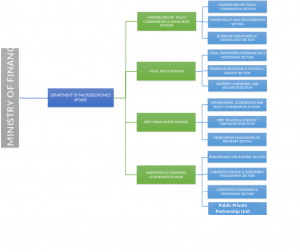Department of Macro-Fiscal and Development Finance (DMDF) supported by four divisions, namely, 1) Macroeconomic Policy Coordination and Surveillance Division, 2) Fiscal Policy Division, 3) Debt Management Division, and 4) Investment and Corporate Governance Division.
The DMDF shall be responsible for coordinating, formulating, and monitoring macroeconomic policies and programs. It shall be the main coordinating agency for economic policies and shall advise the government on macroeconomic and public finance management policies. It shall deal with all matters relating to fiscal policies such as resource mobilization, expenditure envelope, public debt management, capital market development, and relations with bilateral and multilateral financial institutions. All related macroeconomic mandates will be consolidated under the Department to ensure coordinated and efficient management of the economy of the country.
The main macroeconomic coordination roles played by the Policy and Planning Division of the Ministry of Finance shall be transferred to the new Department while the PPD will be expected to focus on policy advisory services and coordination for the Ministry and its departments.
The DMDF shall liaise and coordinate with the Royal Monetary Authority on technical and analytical matters arising from the macroeconomic framework to ensure policy objective consistency between the fiscal and monetary authorities and effective policy coordination. Furthermore, it shall oversee and promote good corporate governance of public enterprises.
Vision
Sound macroeconomic policies for stability, resilience, equitable and sustained economic growth.
Mission
- Ensure sound macroeconomic policy coordination and formulation;
- Ensure fiscal discipline;
- Maintain a sustainable level of public debt;
- Ensure effective assessment and management of macroeconomic risks;
- Ensure macroeconomic aggregate projections are timely and reliable.
Values
The Department shall champion in all the policy analysis and research programs with an impact on the macro-economy of Bhutan through Professionalism, Reliability, Accountability, Predictability, and Transparency.
Mandates
- DMDF shall shoulder very important responsibilities and support the Ministry of Finance to fulfill its mandates as enshrined in the PFA 2007 and Amendment 2012. The Public Finance Act, 2007 & amendment thereof mandates the MoF to:
- Coordinate government macro-economic policies and report on the state of the economy and fiscal position of the Government;
- Facilitate the coordination of macro-economic policies
- Establish a macro-economic framework co-ordination committee to coordinate government macro-economic policies.
- Coordinate other macro-economic and fiscal responsibilities of the Government, including borrowing, on-lending and grants; and
- All roles and responsibilities related to economic management of the country will be consolidated under the DMEA to ensure consistent macroeconomic policies and to ensure sustained socio-economic development.
Key functions
- Policy and planning of macroeconomic management of the country through the coordination of medium-term macroeconomic framework;
- Coordination of key economic sector policies for sound economic management;
- Determine resource envelope and indicative financing for Five Year Plans and Annual Budget Preparations;
- Provide advice and recommendations on economic and fiscal matters;
- Carry out macro-economic surveillance and prescribe appropriate strategies to overcome potential structural and policy risks;
- Ensure public debt is sustainable and contracted at low costs and reasonable degree of risks;
- Prepare debt thresholds recommendations based on Debt Sustainability Analyses and medium-term debt strategies;
- Establish and oversee SOEs and promote good corporate Governance;
- Liaise, coordinate and participate at national, regional and international level on economic issues;
- Carry out economic assessment and valuation of national properties in consultation with National Land Commission, Thromdeys and Local Governments;
- Serve as a secretariat to Macroeconomic Framework Coordination Committees (MFCC) and lead the MFCTC.
Structure of DMDF
As per its mandates and functions, the DMDF is structured to have four divisions, namely;
- Macroeconomic Policy Coordination & Surveillance Division;
- Fiscal Policy Division;
- Debt Management Division; and
- Investment and Corporate Governance Division.
The divisions under the Department will have specific roles and functions. The Divisions will be further delineated into sections to ensure proper division of roles and responsibilities and to perform efficiently.
The Macroeconomic Policy Coordination and Surveillance Division will have following sections:
- Macroeconomic Policy Coordination Section;
- Macro Policy Analysis and Research Section; and
- Economic Monitoring and Surveillance section.
The Fiscal Policy Division will be further segregated into following sections:
- Fiscal Framework Coordination and Monitoring Section;
- Revenue Forecasting and Tax policy analysis section; and
- Property Assessment and Valuation section.
The Debt Management Division will be supported by the following sections:
- International Cooperation and policy coordination section (Front Office);
- Debt Analysis and Strategy Formulation Section (Middle Office); and
- Debt Information Management and Payments Section (Back Office).
The Investment and Corporate Governance Division will have the following sections:
- Performance Management Section;
- Corporate Finance & Investment Management Section; and
- Corporate Governance & Monitoring Section.
- Public Private Partnership Unit.
Organogram
43,292 total views, 4 views today




